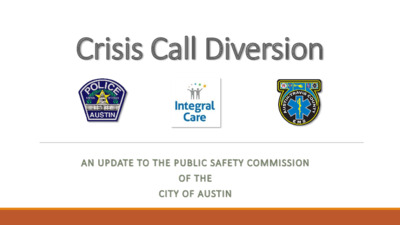PSC Backup- Crisis Call Diversion-Andy Hofmeister (11-2 mtg) — original pdf
Backup

Crisis Call Diversion AN UPDATE TO THE PUBLIC SAFETY COMMISSION OF THE CITY OF AUSTIN Meadows Report Recommendations Total of six recommendations* 1. Advisory Function Developed Within the Behavioral Health and Criminal Justice Advisory Committee (BHCJAC) 2. Mental Health Training for Call Takers 3. Mental Health Integrated Dispatch Sustainability of EMCOT, Including Telehealth Expansion 4. 5. 6. Collaboration with APD Crisis Intervention Team and Community Health Paramedic Program Community Outreach in Collaboration with NAMI Central Texas * http://www.austintexas.gov/edims/pio/document.cfm?id=320044 Meadows Report Recommendations Recommendation #3 “Integrate Integral Care crisis clinicians into the Austin Police Department’s call center for mental health triage of 911 calls and support for officers tasked with answering crisis calls in the field.” Goal Divert appropriate mental health related 9-1-1 calls to a mental health clinician, and when diversion is not appropriate, attempt de-escalation and provide pertinent information to responding officers & EMS staff. Developments: FY19-20 Based on recommendations made in the 2019 Meadows Report: All APD licensed Tele-Communicators trained in Mental Health First Aid (MHFA) APD providing quarterly updates to the Behavioral Health Criminal Justice Advisory Committee (BHCJAC) Integral Care facilitated meetings with local community advocates to discuss report recommendations EMCOT Clinicians stationed on the operations floor & assisting with 911 calls Developments: FY20-21 Continued integration & refinements to workflow in APD City Council approves funding to fully implement Meadows Report recommendations Meadows Mental Health Policy Institute was contracted to oversee implementation EMCOT clinicians assigned to the ATCEMS area of the operations floor Identifying & establishing performance measures Crisis Center Counselors (C3) APD & EMS dispatch workstations provided to Integral Care Clinicians Available 7-days a week ◦ Monday-Friday, 8am to 12am ◦ Saturday-Sunday, 10am to 8pm Working towards 24/7 availability in both dispatch areas Access to both call taking & dispatch systems Current Workflow Person calls 911 for help APD call taker speaks with caller to ensure situation is safe Depending on the circumstances a police officer and/or an ambulance is dispatched Integral Care clinician joins the call and speaks with caller The situation is assessed to determine next steps (i.e. hospital, etc.) Current Data (APD) Timeframe: December 16, 2019 – October 26, 2020 ◦ 39,681 – 911 calls received by APD where mental health was a factor ◦ 1,133 – 911 calls diverted to EMCOT Clinician ◦ 929 – “True Diversions” (No officer dispatched) 911 Calls Appropriate for C3 Transfer Individuals with a non-emergency mental health crisis No evidence of active or imminent violence Disturbances or disputes specifically related to mental health crisis Mental health crisis involving youth May benefit from de-escalation efforts prior to first responder arrival 911 Calls Ineligible for C3 Transfer Violent behavior towards self or others Physical possession of weapons (i.e. firearms, knives, etc.) Commission of a crime (i.e. family violence) Severe intoxication, poisoning or injury Imminent risk of hurting/killing self or others Next Steps Fully implement recommendations, including: ◦ 24/7 availability of a mental health clinician at the Communications Center (CTECC) ◦ Addition of a “Mental Health Services” option to the 9-1-1 triage process (4th option) ◦ 24/7 telehealth availability ◦ Collaborative EMCOT and EMS CHP 24/7 field response THANK YOU! Andy Hofmeister, Assistant Chief, ATCEMS Marisa Aguilar, Practice Manager, Integral Care Ken Murphy, Lieutenant, APD